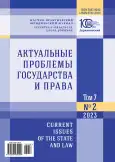The effectiveness of the application of measures of restraint to minors in the form of detention and house arrest
- Authors: MEDVEDEVA S.V.1, MENTUKOVA M.A.2, POPOV A.M.3
-
Affiliations:
- Tambov State Technical University
- Derzhavin Tambov State University
- Moscow Academy of the Investigative Committee of the Russian Federation
- Issue: Vol 7, No 2 (2023)
- Pages: 319-330
- Section: Процессуальное право
- URL: https://bakhtiniada.ru/2587-9340/article/view/303493
- ID: 303493
Cite item
Full Text
Abstract
The problem of minors committing a large number of crimes in recent years has become more and more serious, which is facilitated by the decrease in the social responsibility of adolescents, the spread of soft drugs, and the lack of moral and moral guidelines. With the development of digital technologies, adolescents are increasingly dependent on gadgets, social networks, the opinions of popular personalities among them, and teenage subcultures. All this contributes to an increase in the number of various kinds of crimes committed by minors. In this regard, the question often arises of the need to apply certain preventive measures to minors, in particular, detention and house arrest. Detention, chosen as a measure of restraint, pursues three main goals: ensuring control over the whereabouts of the person against whom charges of a crime have been brought; prevention of new criminal acts, the commission of which is possible while maintaining their freedom of movement; exclusion of the probability of committing actions aimed at obstructing the investigation and avoiding responsibility. The measure of restraint considered by the authors is one of the forms of criminal procedural coercion, which is due to the use of such measures in cases where there is a possibility that the suspect or the accused will attempt to obstruct the administration of justice. The empirical basis of the study was the materials of investigative and judicial practice. The purpose of the study: to analyze the degree of effectiveness of the application of such preventive measures to minors as detention and house arrest.
Keywords
About the authors
Svetlana V. MEDVEDEVA
Tambov State Technical University
Author for correspondence.
Email: Sv-medvede-va@mail.ru
ORCID iD: 0000-0002-7972-5893
PhD (Law), Associate Professor “Criminal Law and Applied Informatics in Jurisprudence” Department
Russian Federation, 106 Sovetskaya St., Tambov, 392000, Russian FederationMaria A. MENTUKOVA
Derzhavin Tambov State University
Email: mariya_men2003@mail.ru
ORCID iD: 0000-0001-8639-2559
PhD (Law), Associate Professor of Criminal Law and Procedure Department, Institute of Law and National Security
Russian Federation, Derzhavin Tambov State UniversityAlexey M. POPOV
Moscow Academy of the Investigative Committee of the Russian Federation
Email: pamtambov@yandex.ru
ORCID iD: 0000-0003-1747-4088
PhD (Law), Associate Professor, Colonel of Justice, Dean of Investigators Training Faculty
Russian Federation, 12 Vrubel St., Moscow, 125080, Russian FederationReferences
- Omel’chenko G.E., Rogozhin V.A. (1986). Nekotorye voprosy primeneniya mer presecheniya k nesovershennoletnim obvinyaemym [Some issues of applying preventive measures to juvenile accused]. Respublikanskii mezhduvedomstvennyi nauchnyi sbornik: Problemy sotsialisticheskoi zakonnosti [Republican Interdepartmental Scientific Collection: Problems of Socialist Legality]. Kharkiv, Graduate School Publ., issue 17, pp. 120-124. (In Russ.) Available at: http://lawlibrary.ru/article1085619.html
- Smirnov A.V., Kalinovskii K.B. (2023). Ugolovnyi protsess [Criminal Process]. Moscow, Norma, Infra-M Publ., 784 p. (In Russ.) Available at: https://search.rsl.ru/ru/record/01008680386
- Vandyshev V.V. (2017). Ugolovnyi protsess. Obshchaya i Osobennaya chaste [Criminal Process. General and Special Parts]. Moscow, Kontrakt, Wolters Kluwer, 755 p. (In Russ.) Available at: https://search.rsl.ru/ru/record/01004400700
- Tetyuev S.V. (2008). Aktual’nye voprosy izbraniya mery presecheniya «Zaklyuchenie pod strazhu» v otnoshenii nesovershennoletnego [Topical issues of choosing a measure of restraint “Detention” in relation to a minor]. Vestnik OmGU. Seriya: Pravo = Herald of Omsk University. Series Law, no. 1, pp. 197-201. (In Russ.) https://elibrary.ru/mnidax
- Makarenko I. (2007). K voprosu o primenenii mery presecheniya v otnoshenii nesovershennoletnikh [On the question of the application of a measure of restraint in relation to minors]. Ugolovnoe pravo [Criminal Law], no. 2, pp. 85-88. (In Russ.) Available at: http://lawlibrary.ru/article1230917.html
- Troinina I.S. (2018). Criminal procedure guarantees of ensuring the rights and legitimate interests minor suspected (defendants) during the electing and application of a measure of restraint in the form of detention. Vestnik Voronezhskogo gosudarstvennogo universiteta. Seriya: Pravo = Proceedings of Voronezh State University. Series: Law, no. 4 (35), pp. 292-298. (In Russ.) https://elibrary.ru/yumlsx
- Emel’yanova A.A. (2020). On the issue of the detention of a juvenile suspect, accused. Kriminalistika: vchera, segodnya, zavtra = Forensics: Yesterday, Today, Tomorrow, no. 2 (14), pp. 218-224. (In Russ.) https://doi.org/10.24411/2587-9820-2020-10045, https://elibrary.ru/attrwj
- Spesivov N.V. (2019). Current issues of implementation in criminal procedure legislation and law enforcement practice of Russia for the requirements of the international standard on the right to protection of liberty and security of person of the matter. Sudebnaya vlast’ i ugolovnyi protsess = Judicial Authority and Criminal Process, no. 1, pp. 152-157. (In Russ.) https://elibrary.ru/zqidut
- Bagautdinov F. (2002). Novaya mera presecheniya v UPK RF – domashnii arest [A new measure of restraint in the Code of Criminal Procedure of the Russian Federation – house arrest]. Zakonnost’ [Legitimacy], no. 9, pp. 14-16.
- Plyushcheva E.L. (2015). Theoretical-law aspects of control over convicts without isolation from society. Rossiiskii sledovatel’ = Russian Investigator, no. 13, pp. 46-48. https://elibrary.ru/ubfuwl
- Manokhina E.Yu. (2020). Features of the election of such preventive measure as house arrest in relation to minors. Vestnik Sankt-Peterburgskogo universiteta MVD Rossii = Bulletin of St. Petersburg University of the Ministry of Internal Affairs of Russia, no. 2 (86), pp. 153-157. (In Russ.) https://doi.org/10.35750/2071-8284-2020-2-153-157, https://elibrary.ru/hmpmpl
Supplementary files









